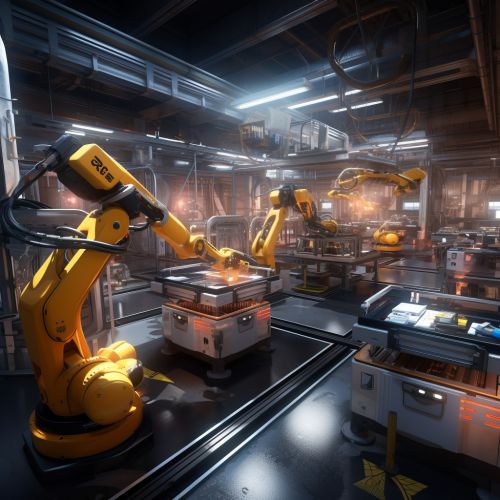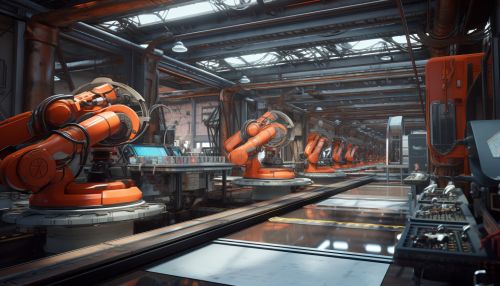Machine Learning in Industrial Automation
Introduction
Machine learning (ML) is a subset of artificial intelligence (AI) that provides systems the ability to automatically learn and improve from experience without being explicitly programmed. In the context of industrial automation, machine learning can be used to optimize processes, improve efficiency, and reduce costs. This article will delve into the various applications of machine learning in industrial automation, the benefits and challenges associated with its implementation, and future trends in this field.


Machine Learning Basics
Machine learning is a method of data analysis that automates analytical model building. It is based on the idea that systems can learn from data, identify patterns, and make decisions with minimal human intervention. Machine learning algorithms are classified into three categories: supervised learning, unsupervised learning, and reinforcement learning.
Supervised Learning
In supervised learning, the algorithm learns from labeled training data, and makes predictions based on that data. A common example of a supervised learning algorithm is a neural network.
Unsupervised Learning
Unsupervised learning algorithms are used when the information used to train is neither classified nor labeled. These algorithms discover hidden patterns or data groupings without the need for human intervention.
Reinforcement Learning
Reinforcement learning is a type of machine learning algorithm that allows the model to determine the ideal behavior within a specific context, in order to maximize its performance. Positive feedback is used to reinforce the behavior that led to the successful outcome.
Machine Learning in Industrial Automation
Machine learning has found numerous applications in the field of industrial automation. These applications range from predictive maintenance and quality control to supply chain optimization and energy management.
Predictive Maintenance
Predictive maintenance utilizes machine learning algorithms to predict the future failure point of a machine component, so that the component can be replaced, based on a plan, just before it fails. This can significantly reduce downtime and increase plant efficiency.
Quality Control
Machine learning can also be used to improve quality control processes in manufacturing. By analyzing data from the production line, machine learning algorithms can predict and detect quality issues in real-time, reducing the need for manual inspection and ensuring that only high-quality products leave the factory.
Supply Chain Optimization
Machine learning can help optimize supply chain operations by predicting demand, optimizing delivery routes, and managing inventory. This can lead to significant cost savings and improved customer satisfaction.
Energy Management
By analyzing data from various sources, machine learning algorithms can predict energy usage patterns and optimize energy consumption in industrial facilities. This can result in significant energy and cost savings.
Benefits of Machine Learning in Industrial Automation
The implementation of machine learning in industrial automation can bring numerous benefits. These include increased efficiency, reduced costs, improved quality, and enhanced decision-making capabilities.
Increased Efficiency
Machine learning algorithms can analyze large amounts of data and identify patterns and trends that humans would not be able to detect. This can lead to significant improvements in process efficiency.
Reduced Costs
By predicting machine failures, optimizing supply chains, and managing energy consumption, machine learning can help reduce operational costs in industrial settings.
Improved Quality
Machine learning can improve product quality by identifying and correcting quality issues in real-time. This can lead to increased customer satisfaction and reduced costs associated with product returns and repairs.
Enhanced Decision-Making Capabilities
Machine learning algorithms can analyze complex data and provide insights that can help managers make more informed decisions. This can lead to improved strategic planning and better business outcomes.
Challenges of Implementing Machine Learning in Industrial Automation
While machine learning offers numerous benefits, its implementation in industrial automation also presents several challenges. These include data quality and availability, lack of skilled personnel, and cybersecurity risks.
Data Quality and Availability
The effectiveness of machine learning algorithms depends on the quality and quantity of the data they are trained on. In many industrial settings, data may be incomplete, inconsistent, or noisy, which can affect the performance of the machine learning models.
Lack of Skilled Personnel
The implementation of machine learning requires a team of skilled data scientists and engineers. However, there is a shortage of such professionals in the market, which can make it difficult for companies to implement machine learning in their operations.
Cybersecurity Risks
The use of machine learning in industrial automation can increase the risk of cyber attacks. Hackers can manipulate the data used to train the machine learning models, leading to incorrect predictions and potentially catastrophic outcomes.
Future Trends in Machine Learning and Industrial Automation
The field of machine learning and industrial automation is rapidly evolving, with new technologies and applications emerging on a regular basis. Some of the key trends to watch out for include the increased use of deep learning algorithms, the integration of machine learning with Internet of Things (IoT) technologies, and the rise of edge computing.
Deep Learning
Deep learning is a subset of machine learning that is based on artificial neural networks with several layers. These algorithms are capable of learning from large amounts of data and are expected to play a key role in the future of industrial automation.
Internet of Things
The integration of machine learning with IoT technologies can enable real-time data analysis and decision-making in industrial settings. This can lead to improved efficiency, reduced costs, and better product quality.
Edge Computing
Edge computing involves processing data at the edge of the network, close to the source of the data. This can reduce latency, improve data security, and enable real-time decision-making, making it a key technology for the future of industrial automation.
See Also
- Artificial Intelligence in Manufacturing
- Big Data in Industrial Automation
- Robotics in Industrial Automation
